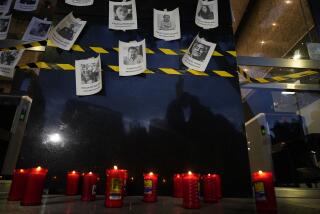PASSINGS: Ernesto Sabato, Henry Cooper, Olaf Helmer
Ernesto Sabato
Argentine writer presided over probe of rulers
Argentine writer Ernesto Sabato, 99, a widely admired intellectual who presided over a probe into the crimes committed by the nation’s military rulers, died Saturday of complications from bronchitis at his home near Buenos Aires, his friend and collaborator Elvira Gonzalez Fraga told Radio Mitre.
Sabato, who trained as a physicist before becoming a writer, wrote the acclaimed “The Tunnel,” first published in 1948, “On Heroes and Tombs” (1961) and “Abaddon, the Exterminator” (1974).
After the end of Argentina’s notorious 1976-83 military rule, Sabato was chosen to preside over the commission that investigated the fate of tens of thousands of Argentines who had disappeared at the hands of the military — kidnapped, tortured and killed.
The commission compiled thousands of pages of chilling evidence of systematic kidnap, torture and rape waged against anyone even remotely suspected of sympathizing with leftist guerrillas.
Its findings and recommendations that the “Dirty War” soldiers should be tried and punished were published in 1984 in a book called “Nunca Mas” (“Never Again”).
Sabato was born June 24, 1911, in the city of Rojas near Argentina’s capital of Buenos Aires.
He earned a doctorate in physics in 1937 but abandoned science for writing. His first novel, “The Tunnel,” was praised by Thomas Mann and Albert Camus.
Henry Cooper
British boxer once floored Cassius Clay
Henry Cooper, 76, a British heavyweight boxer who was best known for knocking down Muhammad Ali while he was still known as Cassius Clay, died Sunday at his son’s home in southern England after a long illness, the British Boxing Board of Control said.
“I am at a loss for words over the death of my friend, Henry Cooper,” Ali said in a statement.
Cooper floored Ali, then an up-and-coming contender named Clay, in the fourth round of a 1963 non-title fight at Wembley Stadium.
Ali won the fight by technical knockout in the next round. They fought again in 1966 in London. That time, Ali was champion and retained his title by stopping a bloodied Cooper in the sixth round.
Cooper, who was born May 3, 1934, in London, had a 40-14-1 record.
Olaf Helmer
Scientist helped develop future studies
Olaf Helmer, 100, a scientist and former Rand Corp. researcher who helped develop the field of future studies, died of natural causes April 14 in Anacortes, Wash., his family said.
Born June 4, 1910, Helmer received a doctorate in mathematics from the University of Berlin in 1934 before fleeing his native Germany as Hitler was expanding his power base. Helmer earned a second doctorate, in logic, at the University of London, studying under Bertrand Russell.
After arriving in the United States, Helmer taught at various universities. He joined Project Rand in 1946, two years before it was renamed the Rand Corp., and worked in the mathematics department of the Santa Monica think tank until 1968.
At Rand and with the Institute of the Future, which he co-founded, Helmer helped develop the Delphi technique, which uses in-depth, systematic interrogation of experts in a given field and evaluates the results with the help of computers. One of its applications was the study of how warfare would be conducted in the future, as well as a conflict’s outcome.
A 1966 Time magazine story about futurists’ predictions for the year 2000 offered this provocative image from Helmer: “If a wife or husband seems to be unusually grouchy on a given evening, says Rand’s Olaf Helmer, a spouse will be able to pop down to the corner drugstore, buy some anti-grouch pills, and slip them into the coffee.”
In 1973 Helmer helped establish the Center for Futures Research at USC in conjunction with its Graduate School of Business Administration. He worked on a forecast project using computers, existing data and new research in an attempt to predict future events across broad social and economic topics.
He left USC in 1977 but continued doing research in systems analysis and long-range forecasting.
Times staff and wire reports
More to Read
Start your day right
Sign up for Essential California for the L.A. Times biggest news, features and recommendations in your inbox six days a week.
You may occasionally receive promotional content from the Los Angeles Times.






